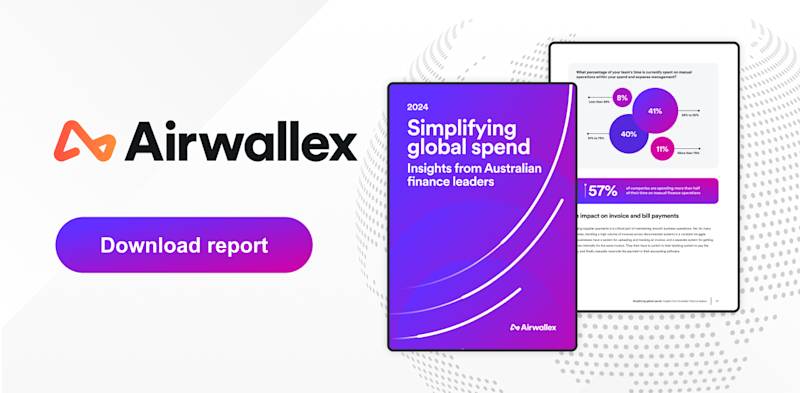Turning global spend challenges into growth opportunities

Ross Weldon
Contributing Finance Writer

Making payments and receiving payments. If you do nothing else but keep those two fundamental functions operating, you’re already setting your business on strong foundations.
As your company starts to grow and cross borders, be it with international suppliers, customers, or a foreign base, these basic tenants become more complicated. You enter the realm of spending in multiple currencies, navigating foreign regulations, payments compliance, and potentially adding new tools to your fintech stack to help with all of the above.
The challenges are such that 88% of Australian finance leaders admit they face challenges in managing global spend and expenses. This includes everything from international supplier and staff payments, transaction and FX fees, logistics, business subscriptions and operational costs.
It’s just one of the learnings from our recent survey of nearly 500 finance leaders in Australia. We commissioned NewtonX to survey executives at SMEs who were involved in decisions relating to spend and expense management. These respondents — ranging from CFOs and directors to business owners — provided insights into the current state of business spending and expense management, and the challenges they face with both domestic and international transactions.
The challenges keeping finance leaders up at night
Operating globally doesn’t just mean having offices overseas — it includes working with international vendors, buying and selling in foreign markets, and managing transactions across borders. In fact, while 57% of Australian companies have a physical presence overseas, a staggering 93% engage in transactions involving foreign currencies. The professionals we surveyed made some honest admissions about the challenges they faced controlling this. The most common identified: a lack of spend controls, insufficient use of automation, and the burden of manual reconciliation. Why did these challenges stand out? Because they’re eminently fixable.
Spend control
97% of Australian businesses admitted that inadequate spend controls have impacted their operations, 63% in a moderate to highly significant way. That’s a significant number of companies who are not effectively managing their outgoing cash and suggests that many companies may be trading or expanding without a solid financial foundation.
Picture this: You give your regional managers corporate cards to handle local expenses, thinking it’ll simplify things. But without proper controls—like setting spending limits or restricting certain categories—these managers could easily end up using the cards for unplanned spend. And because no one’s keeping a close eye on things in real-time, these expenses don’t get flagged until the end of the month. By then, the budget’s blown, cash flow is tight, and payments to other important suppliers might get delayed.
Without proper visibility into expenses and formal approval processes, finance teams are often left in the dark, leading to some unwelcome surprises when it’s time to close the books.
Automation
Two interesting statistics to compare side by side are:
74% of companies find their current systems inefficient and unreliable, especially when it comes to automating spend and expense management.
63% of businesses are still managing expenses manually, often relying on spreadsheets.
Even though finance professionals are frustrated by their current manual processes, the majority are still persisting with them, ignoring the benefits of automation.
Let’s look at a typical example:
An employee submits an expense report by filling out a spreadsheet, attaching scanned receipts, and emailing it to the finance department.
The finance team then manually enters each line item into the accounting system, double-checks for errors, and processes the reimbursement.
This labour-intensive workflow is not only time-consuming but also prone to human error—misplaced decimals, typos, or misclassified expenses can lead to inaccurate financial records. The time spent on data entry, and the inevitable errors that creep in, are productivity drains that prevent finance teams from focusing on more valuable work. Automation could make this entire process happen in seconds.
Manual reconciliation
Our research showed that 33% of companies identify manual reconciliation as a major challenge, and it’s not hard to see why. Tracking and reconciling expenses across multiple, often disconnected systems is not only time-consuming but also prone to errors. This can make it difficult to keep financial records accurate and up to date, ultimately slowing down the entire financial process.
Global expansion complexities
40% of companies report delays in processing international payments — a seemingly small issue that can have major repercussions, from disrupting operations to straining vendor relationships and causing cash flow issues. The complexities of managing global spend, including dealing with multiple currencies and navigating different regulatory environments, adds yet another layer of difficulty to an already challenging task.
Turning challenges into opportunities
While Australian finance teams face challenges, there’s a tremendous opportunity to turn these into competitive advantages. By leveraging platforms specifically designed for the needs of modern finance teams — platforms built with automation and international scalability at their core — businesses can convert inefficiencies into strengths and lay the groundwork for sustained growth.
Automation is at the heart of this transformation. By automating time-consuming tasks, businesses not only save time but also create a smoother, more efficient experience for employees. Whether it’s accelerating reimbursements or streamlining corporate card transactions, automation empowers teams to work smarter and focus on strategic priorities.
“I’ve seen finance functions transform when they have the proper tools, like Airwallex, in place. Spending is no longer just an activity that is ‘controlled’ by finance teams, it becomes something that all employees feel empowered to own. This transparency enhances trust across teams, creating greater efficiencies and opportunities for growth.” Matt Sek, VP SME & Growth (ANZ), Airwallex
Time savings
If you take one thing away from this article, let it be: automation will free your finance team from mundane tasks. By automating manual processes, companies can save significant time. It can help unburden your finance team from the 37% of manual data entry tasks that are currently bogging them down, allowing them to focus on higher-value tasks that drive the business forward. More than half (51%) of Australian finance teams spend more than 50% of their time on these manual tasks.
Minimising errors through automation can lead to direct cost savings, improving your bottom line. And employees benefit from faster reimbursements and hassle-free corporate card usage, improving both productivity and satisfaction.
Enhanced financial control and visibility
Flawless financial data is crucial for decision-making. Unfortunately, only 43% of companies are confident in their data’s accuracy. By using a unified spend management platform, businesses can gain real-time visibility into their spending.
Strengthened relationships
Building strong relationships with suppliers and employees is essential, yet 74% of companies find their systems inefficient, leading to delays and strained relationships. A unified platform like Airwallex ensures faster, more reliable payments, fostering trust and leading to better partnerships and employee satisfaction.
Modernising for global growth
Modernising spend management is essential for any business operating internationally. Traditional methods can’t keep up with the complexities of currency fluctuations, regulations, and cross-border payments. Modern tools simplify this by automating compliance and centralising spend data, helping businesses manage risks and avoid costly mistakes.
That’s where a unified platform like Airwallex comes in. With Airwallex Spend you can streamline your spend management by automating time-consuming tasks, reducing errors, and centralising all your spend data in one place.
Whether it’s managing employee expenses, tracking corporate card usage, or processing supplier invoices, Airwallex provides real-time visibility across all your financial operations. The result? A solution that simplifies decision-making, saves your finance team valuable time, and offers a clear, global view of your spending, no matter where you’re operating.
Simplifying global spend: Insights from Australian finance leaders
For a comprehensive look into how Australian finance leaders are facing the complexities of global spend management, like those mentioned above, download Simplifying global spend: Insights from Australian finance leaders. In the report you’ll find in-depth analysis of the challenges faced by companies of varying sizes, from managing international payments to implementing effective spend controls. By leveraging insights from 500 senior finance leaders, this report offers practical actionable solutions to help businesses modernise their financial operations and thrive in a competitive global landscape.

We dive into the most pressing issues and reveal how the right tools can turn challenges into opportunities. Whether your company is just beginning its global journey or is looking to refine its existing processes, the insights in this report will guide you in building more resilient, efficient, and scalable global spend management processes.
View this article in another region:SingaporeUnited Kingdom

Ross Weldon
Contributing Finance Writer
Ross is a seasoned finance writer with over a decade of experience writing for some of the world's leading technology and payments companies. He brings deep domain expertise, having previously led global content at Adyen. His writing covers topics including cross-border commerce, embedded payments, data-driven insights, and eCommerce trends.
Posted in:
Expense management

